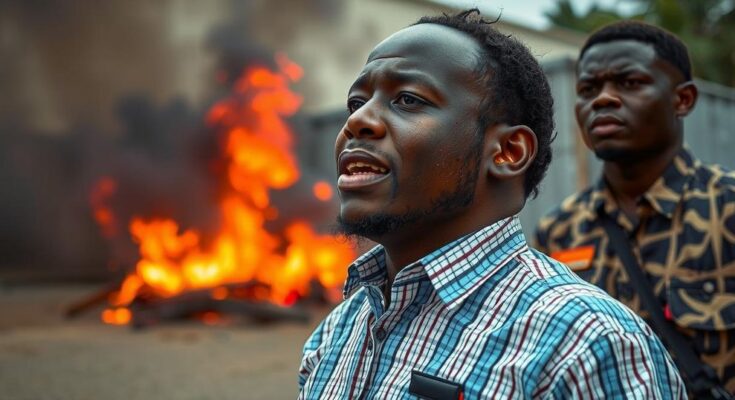Following the confirmation of Daniel Chapo’s election victory in Mozambique, violent protests erupted, resulting in at least 21 deaths, including two police officers. The protests, fueled by supporters of losing candidate Venancio Mondlane, led to widespread looting and property damage. A chaotic atmosphere persists as civil unrest continues to escalate in key cities.
Following the confirmation of Daniel Chapo as the winner of Mozambique’s controversial October 9 elections, a violent uprising has resulted in at least 21 fatalities, including two police officers. The Interior Minister, Pascoal Ronda, indicated that the unrest, driven primarily by the supporters of losing candidate Venancio Mondlane, erupted on account of the court’s ruling. Ronda reported that over 236 incidents of violence occurred in just 24 hours, leading to substantial property damage, including the burning of police vehicles and the vandalism of police facilities.
The post-election environment has been fraught with tension, culminating in nationwide protests that saw demonstrators vandalizing shops and clashing with security forces. In urban centers such as the capital Maputo and the coastal city of Beira, rising hostilities have forced some officials to evacuate. Mondlane’s call for a “shutdown” further exacerbates the volatile situation as demonstrators, primarily young people, respond with aggression against law enforcement. This wave of violence and unrest in Mozambique, a country of approximately 34 million, has heightened fears of continued civil disorder following the elections.
The Constitutional Council’s ruling has not only intensified public dissent but also highlighted underlying political tensions following a season of electoral disputes. As tensions linger and violence escalates, authorities are struggling to regain control, leaving the future of governance and stability in Mozambique uncertain.
Mozambique has a history of political volatility, notably surrounding election cycles where results are often contested. The recent elections on October 9 were no exception, leading to widespread allegations of fraud and manipulation. The ruling party Frelimo, historically dominant in Mozambique’s political landscape, faced significant opposition from Venancio Mondlane of the Mozambique Democratic Movement (MDM). The Constitutional Council’s affirmation of Chapo’s victory has acted as a catalyst for unrest, underscoring the deep political discord within the country. This lawlessness reflects frustrations among youths and political factions who feel disenfranchised and unheard in the political process.
The outbreak of violence in Mozambique following the court’s ruling exemplifies the precarious state of the nation’s political landscape. With the confirmed death toll rising to 21 and the ongoing unrest, the situation remains grave. The government’s ability to quell these disturbances is crucial for restoring order, yet the persistent tensions suggest deeper systemic issues require urgent resolution to prevent further bloodshed and instability. As the nation grapples with these challenges, international observers will likely keep a close watch on developments.
Original Source: apnews.com




